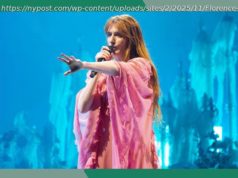The rock band’s fifth album, Painted Ruins, balances mysterious complexity with pure loveliness.
The inspiration for “Four Cypresses, ” off Grizzly Bear’s spindly and hypnotic new album Painted Ruins, came one night when the singer Daniel Rossen returned to a Los Angeles apartment he’ d been renting to find a man sleeping in his driveway. The next morning, he looked out the window and considered the thought of the man looking at the same thing as him: four cypresses in the neighbor’s yard. “The basis of the lyric, that’s where it came from—the idea of displacement, and homelessness, really, ” Rossen told the podcast Song Exploder . “Trying to connect with someone else’s experience, trying to find shared experience with someone that’s having a much worse time than I am.”
Without that story, the song would be indecipherable lyrically, but still fascinating as music. It begins with an off-kilter groove of pinging keyboard and drums that, via the guiding help of a bassline, eventually steadies itself. Rossen—quavering, mannered, churchly—watches someone watch: “Instead of moving / You stared into the wall.” Guitars dive in, at first gentle then knotted; the arrangement grows and heaves, and Rossen sounds agitated. Eventually, though, there’s a sensation of free-falling into a passage of utter prettiness. Maybe that’s the moment when the sight-lines of narrator and subject meet. It’s certainly when all four band members, finally, pull in the same direction.
What’s Wrong With Arcade Fire’s Everything Now?
Grizzly Bear built a following from 2002 to 2012 by blending experimentalism, atmosphere, and audience-pleasing ambition in a way that typified the best of their era’s indie rock. The songs had common ingredients—two highly distinctive singers, textural guitar influenced by folk and jazz and flamenco, carnivalesque keyboard and classical woodwinds—but no common formula. When they wanted it to, their tinkering could achieve surprising catchiness, as with 2006’s “Knife” or 2009’s “Two Weeks.” But usually, they followed an internal logic, making music to get lost in.
The foursome has talked about their unease with how the music world has changed in the five years since their fourth album, Shields. With the rise of all-you-can-stream content overload and with the dwindling of robust online venues for fans to obsess and argue over rock music, how many people are going to have the patience for a new Grizzly Bear album? Painted Ruins at first seems to address this conundrum by grabbing attention with insistent, jittery rhythms that seem to promise exciting anthems. But the songs are actually less accessible than they initially appear. Painted Ruins just gets more jagged and inscrutable beneath its surface—though its craftsmanship is never less than impressive.
One thing that does seem clear is that the band is interested in the murky and instinctual way humans negotiate with one another. Singer Ed Droste has said that he doesn’ t want his recent divorce to provide the lens through which the album is viewed, and that’s fair. The listener should apply their own context to subtly devastating songs like “Neighbors, ” which seems to describe two people who live near each other but are unable or unwilling to achieve intimacy. Same goes for the kraut-rock thrum of “Mourning Sound, ” which ascribes a sense of grief to the noises of the world Droste and Rossen sing about: dogs barking, trucks driving. Anyone who has had their perception reshaped by loss, which is to say most anyone, can relate in their gut.
The real drama of these songs is musical, in the push and pull between band members. Grizzly Bear call themselves a “democracy” and have said that over the years the recording process has become less frictional, more “adult.” Perhaps that explains the remarkable cohesion of Painted Ruins across a variety of dizzying arrangements and song structures. Through it all, the titular “paint” seems confined to shades of just a few colors—blue and grey, perhaps. To be sure, the album lacks the arresting tonal change-ups and sneaky hooks of their older material. But there’s a heap of satisfaction to be gained from giving oneself over to these songs’ carefully conjured moods, alternatively contemplative and grandiose. There’s even more fun to be had from zooming in on the fine details: the bird-squall guitars of the standout closer “Sky Took Hold, ” the glum bass thumbing on “Wasted Acres, ” the toy-box sounds of “Losing All Sense.”
Whenever it seems the band is getting too tangled up building altars for some indescribable muse, it straightens itself out, delivering the timeless pleasure of tension built and then released. The woozy, prog-touched “Three Rings” justifies its fussiness during a mid-song reverie on par with Radiohead’s most absorbing passages. When the queasy-making carousel of “Aquarian” starts to slow down as Rossen repeats “never reach the end, ” you may well hope the ride goes on forever. Such moments of conflict giving way to peace comfortingly suggest, again and again, a resolution of the eternal struggle Droste spoke of: to connect.






